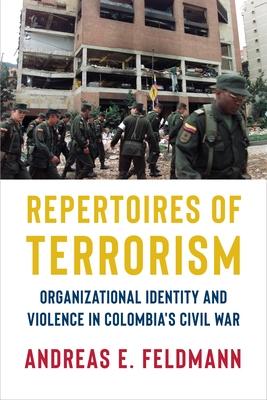Why do armed groups employ terrorism in markedly different ways during civil wars? Drawing on more than a decade of fieldwork, Andreas E. Feldmann examines the disparate behavior of actors including guerrilla groups, state security forces, and paramilitaries during Colombia's long and bloody civil war. Analyzing the varieties of violence in this conflict, he develops a new theory of the dynamics of terrorism in civil wars.
Feldmann argues that armed groups' distinct uses--repertoires--of terrorism arise from their particular organizational identities, the central and enduring attributes that distinguish one faction from other warring parties. He investigates a range of groups that took part in the Colombian conflict over the course of its evolution from ideological to criminal warfare, demonstrating that organizational identity plays a critical role in producing and rationalizing violence. Armed parties employ their unique repertoires as a means of communication to assert their relevance and territorial presence and to differentiate themselves from enemies and rivals. Repertoires of Terrorism is based on an extensive data set covering thousands of incidents, as well as interviews, archival research, and testimony. It sheds new light on both armed groups' use of violence in Colombia's civil war and the factors that shape terrorist activity in other conflicts.
Book
Repertoires of Terrorism: Organizational Identity and Violence in Colombia's Civil War
(Write a Review)
Paperback
$38.89
Why do armed groups employ terrorism in markedly different ways during civil wars? Drawing on more than a decade of fieldwork, Andreas E. Feldmann examines the disparate behavior of actors including guerrilla groups, state security forces, and paramilitaries during Colombia's long and bloody civil war. Analyzing the varieties of violence in this conflict, he develops a new theory of the dynamics of terrorism in civil wars.
Feldmann argues that armed groups' distinct uses--repertoires--of terrorism arise from their particular organizational identities, the central and enduring attributes that distinguish one faction from other warring parties. He investigates a range of groups that took part in the Colombian conflict over the course of its evolution from ideological to criminal warfare, demonstrating that organizational identity plays a critical role in producing and rationalizing violence. Armed parties employ their unique repertoires as a means of communication to assert their relevance and territorial presence and to differentiate themselves from enemies and rivals. Repertoires of Terrorism is based on an extensive data set covering thousands of incidents, as well as interviews, archival research, and testimony. It sheds new light on both armed groups' use of violence in Colombia's civil war and the factors that shape terrorist activity in other conflicts.Paperback
$38.89